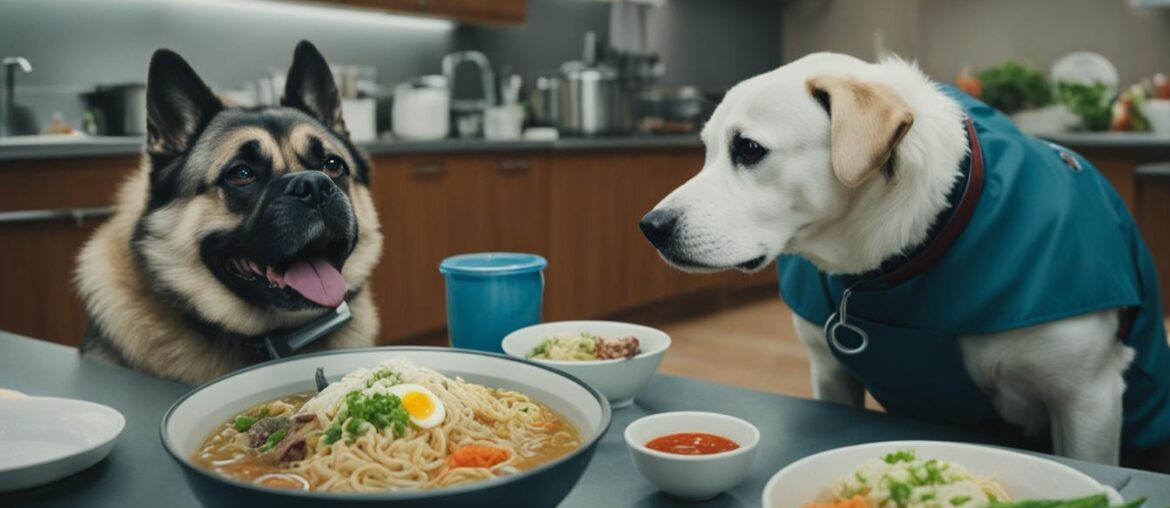Ramen noodles have gained popularity worldwide as a quick and tasty meal option. But as pet owners, it’s important to consider if our canine companions can safely enjoy this dish too. In this article, I will explore whether dogs can eat ramen noodles, the potential risks associated with their consumption, and provide alternative options for a dog-friendly meal.
Key Takeaways:
- Dogs should not consume regular ramen noodles due to their high sodium content and ingredients like garlic and onion, which can be harmful to dogs.
- South Korea has introduced dog-friendly ramen noodles, such as Ansim Daengmyeon, which are made specifically for dogs using healthy ingredients.
- Instead of feeding your dog ramen noodles, consider cooking homemade meals using lean meats, vegetables, and plain noodles to ensure a balanced and nutritious diet.
- Regular consumption of ramen noodles may lead to poor nutritional value in a dog’s diet, dental health issues, and potential allergic reactions.
- When selecting pet food for your dog, follow pet food safety guidelines and choose commercially prepared dog food that meets their nutritional requirements.
The Rise of Dog-Friendly Ramen in South Korea
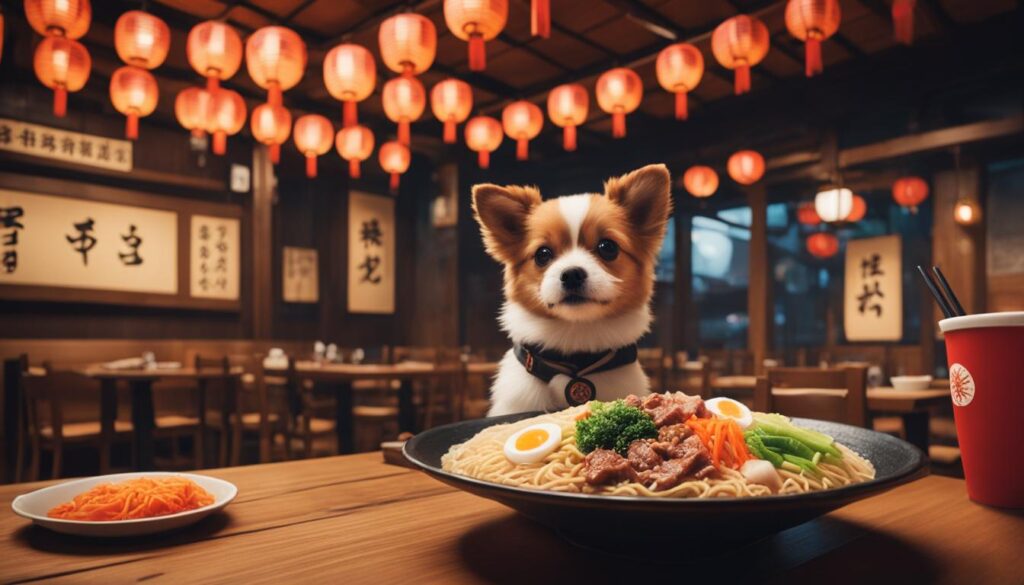
In South Korea, there has been a growing trend of introducing dog-friendly instant ramen noodles to cater to our beloved furry friends. One notable brand in this segment is Ansim Daengmyeon, developed by Youngin Bio, which offers a delicious and healthy option for dogs.
Ansim Daengmyeon is a special line of dog-only instant noodles that are specifically formulated with their unique dietary needs in mind. These noodles are made with ingredients such as white rice barley malt and dried pollack, which provides a good source of protein for dogs.
What sets Ansim Daengmyeon apart is not only its nutritional value but also its texture. The noodles are soft and easy to chew, making them an ideal choice for senior dogs or those with dental issues.
By incorporating dog-friendly ingredients and focusing on their well-being, Ansim Daengmyeon ensures that our furry companions can now enjoy a delicious bowl of instant ramen noodles tailored to their specific dietary requirements.
With the rise of dog-friendly ramen in South Korea, dog owners can now indulge their pets with a tasty treat without compromising their health and nutritional needs. Ansim Daengmyeon is just one example of the innovative offerings available in the market, showcasing the commitment to providing pet owners with convenient and safe food options.
Next, let’s explore the potential hazards of regular ramen noodles for dogs and why it’s important to opt for dog-friendly alternatives.
The Hazards of Regular Ramen Noodles for Dogs
Regular ramen noodles can pose significant health risks to dogs. These popular instant noodles contain high levels of sodium, which can be detrimental to a dog’s well-being. Consuming ramen noodles can lead to an imbalance in their electrolyte levels, potentially resulting in dehydration or even salt poisoning.
In addition to the high sodium content, regular ramen noodles often contain harmful ingredients like garlic and onion. While these ingredients may enhance the flavor for humans, they can be toxic to dogs. Garlic and onion can cause anemia in dogs by destroying their red blood cells. It’s crucial to avoid feeding dogs regular ramen noodles to prevent these health risks.
Furthermore, the fatty meats commonly found in ramen can be challenging for dogs to digest. Consumption of these fatty meats can lead to pancreatitis, a potentially life-threatening condition characterized by inflammation of the pancreas. Dogs with pancreatitis may experience symptoms such as vomiting, abdominal pain, and loss of appetite.
To illustrate the potential risks of regular ramen noodles for dogs, consider the following table:
| Health Risks of Dogs Eating Ramen | High Sodium Content | Harmful Ingredients | Difficulty in Digestion |
|---|---|---|---|
| Dehydration | Anemia | Pancreatitis | |
| Salt Poisoning |
Ramen Noodles: A High Sodium Concern
The high sodium content in regular ramen noodles can lead to severe health problems for dogs. Dogs, like humans, require a balanced diet with a limited amount of sodium. Consuming excessive sodium can strain the kidneys, leading to kidney damage or even kidney failure. Excessive sodium intake in dogs can also contribute to high blood pressure, putting them at risk for heart disease or stroke.
Harmful Ingredients in Ramen Noodles
Garlic and onion, commonly found in regular ramen noodles, are toxic to dogs. These ingredients can destroy a dog’s red blood cells, leading to anemia. Anemia can cause weakness, fatigue, and pale gums in dogs, reducing their overall quality of life. It is essential to be cautious and ensure that any food given to dogs does not contain these harmful ingredients.
Difficulties in Digesting Fatty Meats
The fatty meats often included in ramen noodles can be challenging for dogs to digest. Dogs have a sensitive digestive system that is not designed to process high-fat foods. Feeding dogs fatty meats can lead to gastrointestinal upset, including vomiting, diarrhea, and discomfort. Furthermore, the accumulation of fat over time can contribute to obesity, which is associated with numerous health issues in dogs.
Nutritional Value of Ramen Noodles
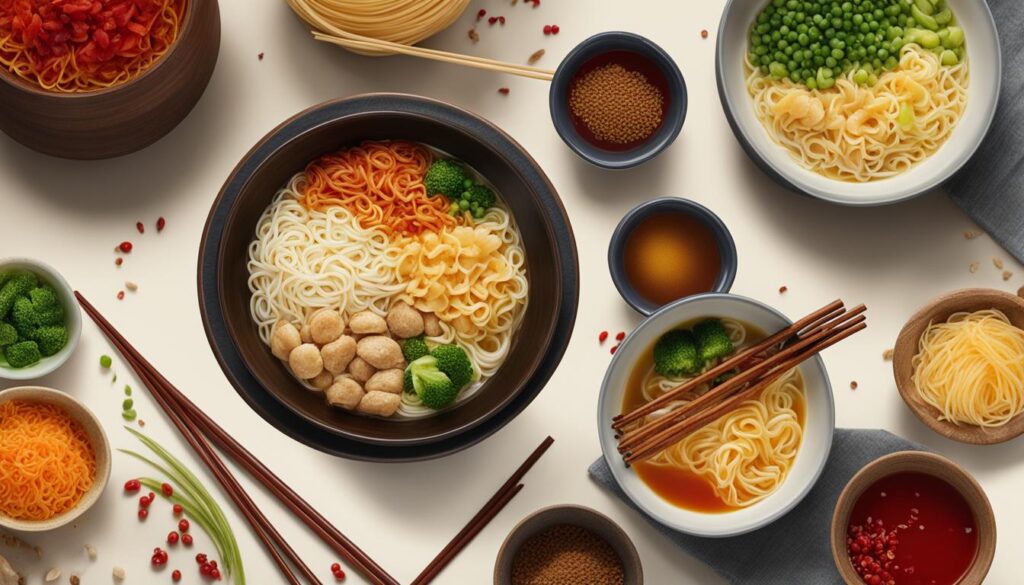
Instant ramen noodles are a popular convenience food, but they offer limited nutritional value, especially for dogs. One serving of instant ramen noodles typically contains carbohydrates, fat, and minimal protein.
Dogs require a balanced diet that includes an adequate amount of protein to support their overall health and wellbeing. However, ramen noodles have a low protein content, making them unsuitable as a primary source of nutrients for dogs.
Furthermore, instant ramen noodles lack essential vitamins and minerals that dogs need to thrive. Vitamins such as Vitamin A and Vitamin C, as well as minerals like calcium, are crucial for a dog’s overall health. The absence of these nutrients in ramen noodles further diminishes their nutritional value for dogs.
Table: Nutritional Facts of Instant Ramen Noodles
| Nutrient | Amount per Serving |
|---|---|
| Calories | 190 |
| Carbohydrates (g) | 26 |
| Fat (g) | 7 |
| Protein (g) | 4 |
| Vitamin A | 0% |
| Vitamin C | 0% |
| Calcium | 2% |
In summary, ramen noodles have limited nutritional value for dogs due to their low protein content and lack of essential vitamins and minerals. It’s important to provide dogs with a well-balanced diet that meets their nutritional needs and supports their overall health. Instead of feeding ramen noodles to dogs, it’s recommended to explore healthier alternatives and consult with a veterinarian for guidance on creating a nutritious meal plan tailored to your dog’s specific needs.
Cooking Healthy Meals for Your Dog
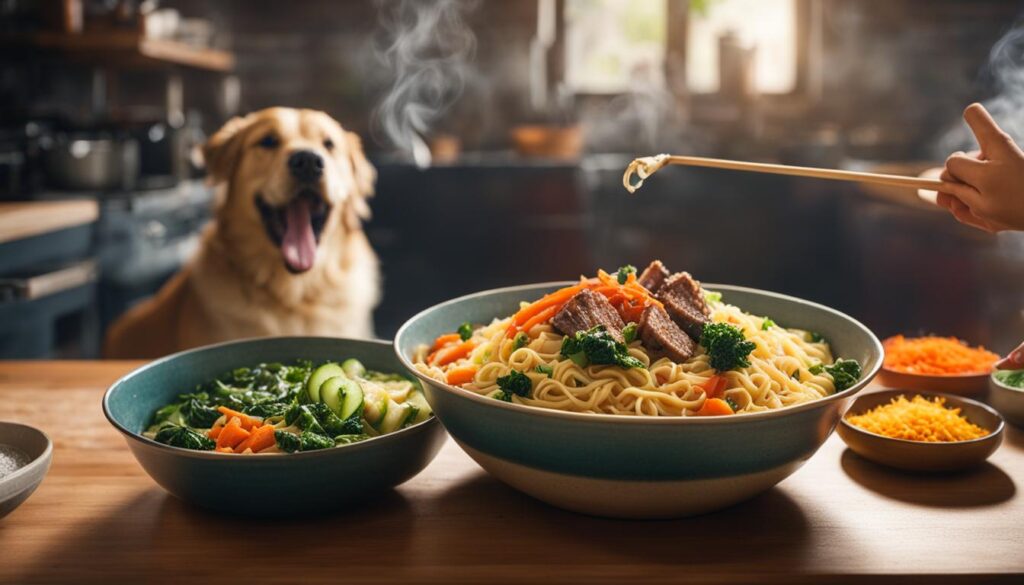
Instead of feeding your dog ramen noodles, consider cooking healthy meals specifically for them. By preparing homemade dog-friendly noodle recipes, you can ensure your furry friend receives nutritious dog meals without the potential risks associated with regular ramen noodles.
When cooking for your dog, focus on incorporating ingredients like lean meats, vegetables, and plain noodles. These wholesome and dog-safe ingredients provide the necessary nutrients for your pet’s overall well-being. Here is a simple homemade dog-friendly noodle recipe to get you started:
Chicken and Vegetable Noodle:
- Cook plain noodles according to package instructions and set aside.
- Boil boneless, skinless chicken breast until fully cooked.
- Chop cooked chicken into small, bite-sized pieces.
- Sauté a variety of dog-safe vegetables like carrots, broccoli, and zucchini in a little olive oil until tender.
- Mix the cooked chicken, sautéed vegetables, and boiled noodles together in a bowl.
- Allow the mixture to cool before serving it to your dog.
The above recipe is just one example, but the opportunities are endless when it comes to homemade dog meals using noodles. You can customize the ingredients based on your dog’s preferences and dietary needs. Remember to consult with your veterinarian to ensure your homemade meals provide a nutritionally balanced diet for your beloved pet.
Dog-Friendly Noodle Recipe Benefits:
- Control over ingredients: By cooking for your dog, you have full control over the ingredients, ensuring they are safe and suitable for your pet.
- Nutritional balance: Homemade meals allow you to provide a balanced diet, incorporating the necessary proteins, carbohydrates, and vitamins your dog needs.
- Food allergies or sensitivities: If your dog has specific dietary restrictions or allergies, homemade meals help you avoid trigger ingredients and customize their food accordingly.
| Nutritional Value | Chicken and Vegetable Noodle Recipe | Instant Ramen Noodles* |
|---|---|---|
| Protein | High protein from chicken | Minimal protein |
| Fat | Low-fat lean meats | Fatty meats |
| Carbohydrates | Nutrient-rich vegetables and plain noodles | Carbohydrates from noodles |
| Vitamins and Minerals | Multiple vitamins and minerals from vegetables and lean meats | Limited vitamins and minerals |
*Nutritional values may vary depending on the brand of instant ramen noodles.
Health Concerns with Dogs Consuming Ramen
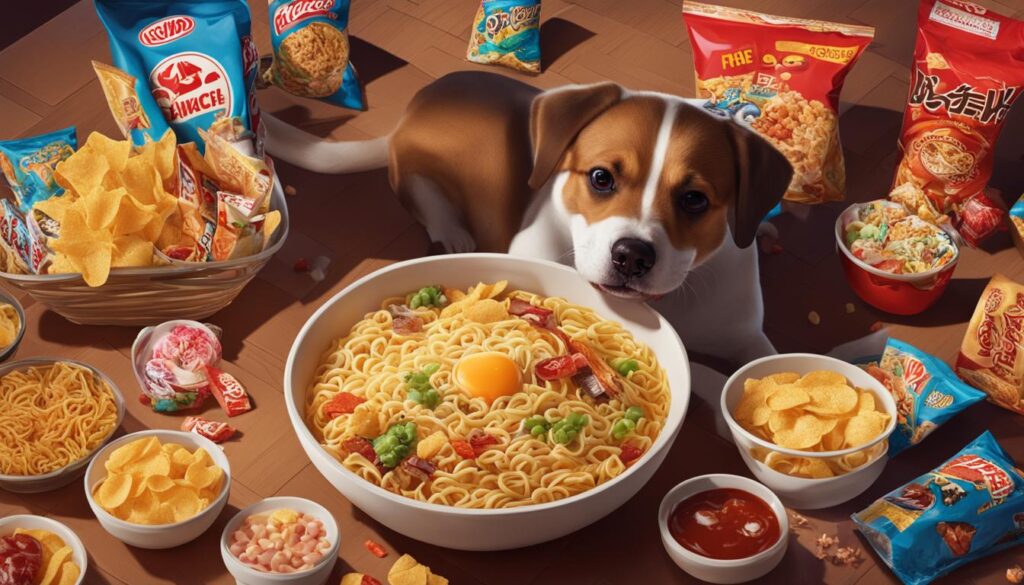
When it comes to dogs eating ramen, there are several health concerns that dog owners should be aware of. Regular consumption of ramen noodles can result in poor nutritional value in a dog’s diet, leading to various health issues.
One major concern is the high salt content found in ramen noodles. Dogs are more sensitive to salt than humans, and an excessive salt intake can lead to salt overload in dogs. This can cause dehydration, kidney problems, and even high blood pressure in dogs.
Furthermore, ramen noodles often contain ingredients that can trigger allergic reactions in dogs. Wheat and flour, commonly found in ramen noodles, are known allergens for some dogs. An allergic reaction to ramen can manifest as vomiting, diarrhea, or skin irritations.
It’s crucial for dog owners to closely monitor their pet’s diet and ensure they are not regularly consuming ramen noodles. If your dog exhibits frequent digestive issues or shows symptoms of an allergic reaction after consuming ramen, it’s recommended to consult a veterinarian for a proper evaluation and guidance.
| Health Concerns | Effects on Dogs |
|---|---|
| Poor Nutritional Value | Low energy levels, kidney failure, or high blood pressure |
| Salt Overload | Dehydration, kidney problems, and high blood pressure |
| Allergic Reactions | Vomiting, diarrhea, and skin irritations |
Remember, it’s always best to prioritize your dog’s health and provide them with a balanced and nutritious diet. If you’re looking for alternative meal options for your dog, consider cooking homemade meals using fresh ingredients that are safe and beneficial for their well-being.
Pet Food Safety Guidelines
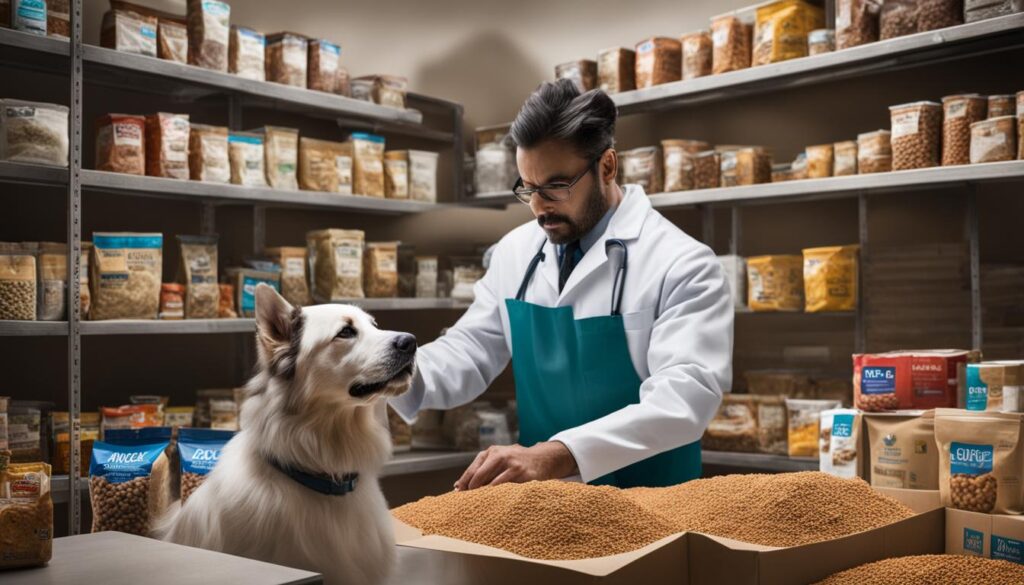
When it comes to selecting food for your dog, prioritizing their safety and nutrition is crucial. Follow these pet food safety guidelines to ensure you’re providing the best possible diet for your furry friend.
Choose Safe Dog Food
Opt for commercially prepared dog food that meets the nutritional requirements for your dog’s age, size, and breed. Look for brands that use high-quality ingredients and adhere to safety standards. Avoid dog food that contains harmful additives, artificial preservatives, or excessive amounts of fillers.
Read Pet Food Labels
Take the time to carefully read and understand the information on pet food labels. Look for complete and balanced diets that contain the necessary nutrients your dog needs for optimal health. Pay attention to the order of ingredients, as they are listed by weight. Ensure that quality protein sources, such as meat or fish, are listed at the top.
Additionally, check for any potential allergens that your dog may be sensitive to. If your dog has any dietary restrictions or specific health conditions, consult with your veterinarian to determine the most suitable pet food options.
Ensure Proper Storage
Proper storage of pet food is essential to maintain its freshness and prevent spoilage. Follow the manufacturer’s instructions for storing the food, including guidelines on temperature and expiration dates. Keep the food in a cool, dry place, away from direct sunlight and pests.
Monitor Your Dog’s Health
Even with safe and high-quality dog food, it’s important to monitor your dog’s health regularly. Watch for any signs of food intolerance or allergies, such as digestive issues, skin irritations, or changes in behavior. If you notice any concerning symptoms, consult with your veterinarian for appropriate advice and guidance.
By following these pet food safety guidelines, you can make informed choices about what your dog eats, ensuring their well-being and providing them with a safe and balanced diet.
Homemade Dog Food for Nutritional Balance
To ensure your dog receives proper nutrition, consider adding homemade food to their diet. Many recipes are available online that provide balanced meals incorporating fresh vegetables, lean meats, and necessary vitamins and minerals. You can also consult with your veterinarian to determine if your dog requires additional nutritional supplements.
When preparing homemade dog food, it’s important to remember that dogs have specific dietary requirements. A balanced dog diet should include a proper balance of protein, carbohydrates, fats, vitamins, and minerals. By making food at home, you can have control over the ingredients and ensure that your dog is getting the necessary nutrients for their overall health and well-being.
One of the advantages of homemade dog food is the ability to tailor the recipes to your dog’s individual needs. For example, if your dog has specific dietary restrictions or allergies, you can easily modify the ingredients accordingly. Additionally, homemade dog food allows you to avoid any potential additives or preservatives that may be present in commercial dog food.
When creating homemade dog food recipes, it’s essential to include a variety of ingredients to ensure a balanced diet. This includes lean meats like chicken, turkey, or fish for protein, whole grains such as brown rice or quinoa for carbohydrates, and a mix of vegetables like carrots, peas, and sweet potatoes for essential vitamins and minerals. Some recipes may also call for the addition of nutritional supplements for dogs to ensure they receive all the necessary nutrients.
Here is an example of a homemade dog food recipe that provides a balanced meal:
| Ingredients | Amount |
|---|---|
| Chicken (cooked and shredded) | 1 cup |
| Brown rice (cooked) | 1 cup |
| Carrots (diced and cooked) | 1/2 cup |
| Green beans (cooked) | 1/2 cup |
| Pumpkin puree | 1/4 cup |
| Fish oil (as a supplement) | 1 tablespoon |
Simply mix all the ingredients together and feed it to your dog in appropriate portions based on their size and weight. It’s always best to consult with your veterinarian to ensure the recipe is suitable for your dog’s specific nutritional needs.
Remember, homemade dog food should be prepared with care and attention to detail. It’s crucial to follow proper food handling and storage guidelines to prevent any bacterial contamination or spoilage. Additionally, always introduce any new food gradually to your dog’s diet and monitor their response for any signs of allergies or digestive issues.
By providing your dog with homemade food, you can ensure they receive a nutritionally balanced diet tailored to their unique needs. However, it’s essential to consult with your veterinarian to ensure you’re meeting all their nutritional requirements and to address any specific health concerns or dietary restrictions they may have.
Dental Health Considerations
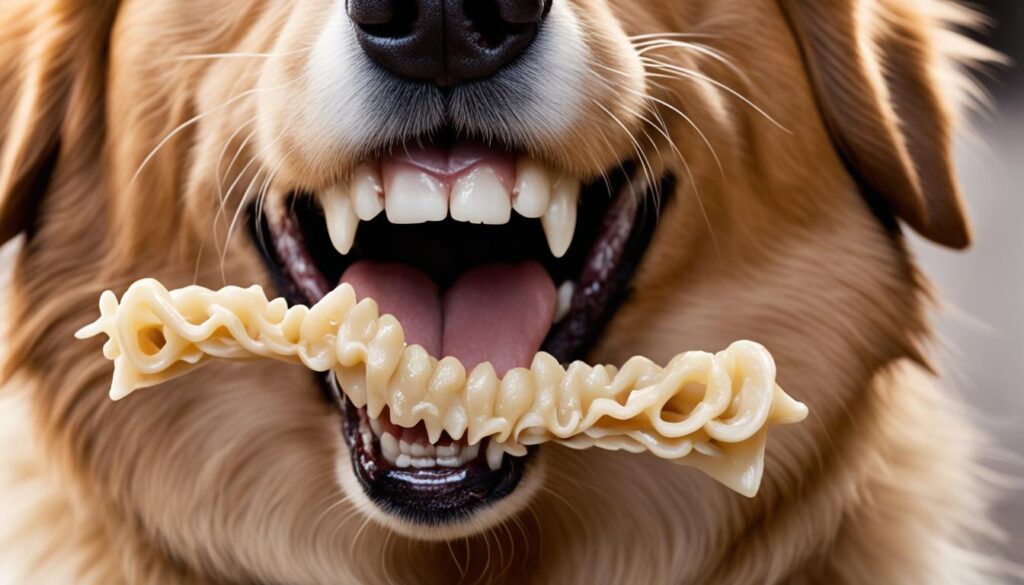
Ensuring proper dental health in dogs is essential for their overall well-being. While many pet owners prioritize their dog’s diet, it’s important to also consider the impact of certain foods on their dental health. One such food to be cautious of is Japanese-style ramen noodles.
While dogs can tolerate small quantities of these noodles, it’s crucial to note that they have a highly acidic nature. This acidity can potentially damage a dog’s tooth enamel over time, leading to dental issues.
A dog’s tooth enamel is the protective outer layer of their teeth, and damage to it can result in tooth sensitivity, decay, and erosion. Regular consumption of acidic foods, like ramen noodles, can contribute to these dental problems in dogs.
To protect your dog’s dental health, it’s important to be mindful of the types of food you offer them. Avoid giving them foods with high acidity levels, such as ramen noodles, on a regular basis.
Instead, focus on providing a balanced diet that promotes good oral hygiene. Opt for dental-friendly treats and chew toys that can help remove plaque and tartar buildup. Regular brushing of your dog’s teeth is also highly recommended.
By taking these steps to protect your dog’s dental health, you can prevent potential dental issues and ensure their overall well-being.
References:
- “Dental Health in Dogs.” American Veterinary Dental College, https://www.avdc.org/dental-health.html
- “Acid Erosion in Dogs’ Teeth.” VCA Hospitals, https://vcahospitals.com/know-your-pet/acid-erosion-in-dogs-teeth
- “Tooth Enamel Erosion in Dogs.” Animal Dental Center, https://www.animaldentalcenter.com/2016/07/29/tooth-enamel-erosion/
Wrapping Up
In conclusion, it is not recommended to feed regular ramen noodles to dogs. These noodles can pose health risks and lack the necessary nutritional value for a dog’s diet. However, there are alternatives that can provide a healthy and safe option for your furry friend.
One alternative is to prepare homemade meals specifically for your dog. By using lean meats, vegetables, and plain noodles, you can create a nutritious and balanced meal that meets their dietary needs. This ensures that your dog receives the proper nutrients without the potential risks associated with regular ramen noodles.
Another option is to consider dog-specific instant noodles. There are brands available, such as Ansim Daengmyeon, that offer instant noodles specifically designed for dogs. These noodles are soft to chew and provide essential nutrients that dogs require.
When making dietary choices for your dog, it is essential to prioritize their health and consult with a veterinarian. They can provide guidance on the best options for your dog’s specific needs and ensure they receive a balanced and safe diet.
References
For further information on ramen noodles for dogs, dog-friendly instant noodles, and dog food safety guidelines, refer to the following sources:
- American Kennel Club: The American Kennel Club website provides valuable information on dog breeds, nutritional requirements, and pet care tips.
- ASPCA: The ASPCA website offers resources on dog nutrition, health, and general care, including guidelines for choosing safe and nutritious food for your canine companion.
- FDA Animal Health Literacy: The FDA Animal Health Literacy webpage provides information on pet food safety regulations, recalls, and guidelines for feeding dogs a balanced diet.
- The Humane Society of the United States: The Humane Society’s website offers articles and resources on responsible pet ownership, including tips on selecting safe and nutritious food for dogs.
- PetMD: PetMD’s dog nutrition center provides detailed articles and expert advice on dog food safety, proper nutrition, and healthy meal options for dogs.
- Cornell University College of Veterinary Medicine: The Cornell University College of Veterinary Medicine website offers resources on pet care, including information on dog nutrition and food safety.
| Website | Description |
|---|---|
| American Kennel Club | The American Kennel Club website provides valuable information on dog breeds, nutritional requirements, and pet care tips. |
| ASPCA | The ASPCA website offers resources on dog nutrition, health, and general care, including guidelines for choosing safe and nutritious food for your canine companion. |
| FDA Animal Health Literacy | The FDA Animal Health Literacy webpage provides information on pet food safety regulations, recalls, and guidelines for feeding dogs a balanced diet. |
| The Humane Society of the United States | The Humane Society’s website offers articles and resources on responsible pet ownership, including tips on selecting safe and nutritious food for dogs. |
| PetMD | PetMD’s dog nutrition center provides detailed articles and expert advice on dog food safety, proper nutrition, and healthy meal options for dogs. |
| Cornell University College of Veterinary Medicine | The Cornell University College of Veterinary Medicine website offers resources on pet care, including information on dog nutrition and food safety. |
Disclaimer
The information provided in this article is for informational purposes only and should not replace professional veterinary advice. While I strive to provide accurate and up-to-date information, I recommend consulting with a veterinarian before making any changes to your dog’s diet or feeding routine. Every dog is unique and may have specific dietary requirements or health conditions that should be taken into consideration.
A veterinarian can assess your dog’s individual needs, provide guidance on nutrition, and recommend suitable alternatives if necessary. They have the expertise to evaluate potential risks and benefits based on your dog’s age, breed, size, and overall health. Consulting with a veterinarian can help ensure that your dog receives a safe and appropriate diet that meets their specific nutritional needs.
Remember, what may be safe and healthy for humans may not be suitable for dogs. Some human foods, including certain ingredients in ramen noodles, can be harmful or toxic to dogs. It’s essential to prioritize your dog’s well-being and seek professional guidance to make informed decisions about their diet.
FAQ
Can dogs safely eat regular ramen noodles?
No, regular ramen noodles can be harmful to dogs due to their high sodium content and the presence of ingredients like garlic and onion, which can cause anemia. The fatty meats often used in ramen can also be difficult for dogs to digest and may lead to pancreatitis.
Are instant ramen noodles a good option for dogs?
No, instant ramen noodles lack significant nutrients and are low in protein. They also lack important vitamins and minerals that dogs need in their diet.
What are some dog-friendly alternatives to ramen noodles?
Instead of ramen noodles, you can cook homemade meals for your dog using ingredients like lean meats, vegetables, and plain noodles. There are also dog-specific instant noodles available, such as Ansim Daengmyeon, that are designed for canine consumption.
Are there any health risks associated with dogs consuming ramen?
Dogs that consume ramen regularly can experience nutritional deficiencies, low energy levels, kidney failure, high blood pressure, and digestive issues. Some dogs may also be allergic to ingredients like wheat or flour, resulting in vomiting, diarrhea, or skin irritations.
How can I ensure my dog’s diet is safe and balanced?
To ensure your dog’s diet is safe and balanced, follow pet food safety guidelines and choose commercially prepared dog food that meets nutritional requirements. Read pet food labels carefully to avoid harmful additives. Consider adding homemade food to your dog’s diet with balanced recipes and consult with a veterinarian for additional nutritional supplements if needed.
Can the consumption of ramen noodles affect my dog’s dental health?
Yes, regular consumption of highly-acidic foods like ramen noodles can potentially damage a dog’s tooth enamel, leading to dental issues such as tooth decay and erosion. It’s important to be mindful of the types of food you offer your dog and take steps to protect their dental health.
Can I feed my dog small quantities of Japanese-style ramen noodles?
While small quantities of Japanese-style ramen noodles may be tolerable for dogs, it’s important to monitor their consumption and take into consideration the potential impact on their dental health. However, a balanced and nutritious diet specifically designed for dogs is always the best option.


